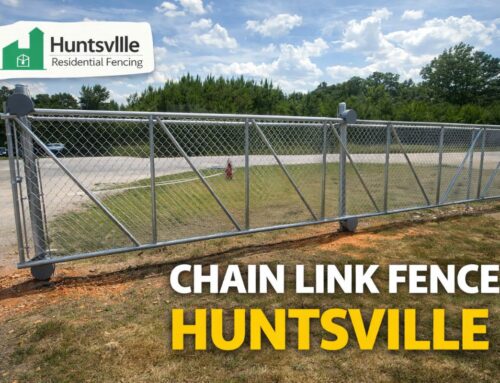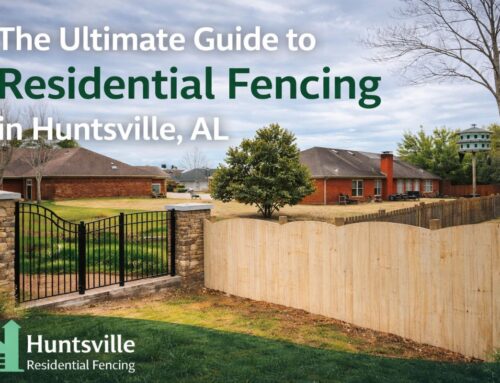What Type Of Fence Lasts The Longest?
The type of fence that lasts the longest is made of metal, such as wrought iron or chain-link, with a galvanized finish. Vinyl fence also is a good long-lasting option. These materials are durable and can last for decades with proper maintenance.
The right choice saves you money and time. Yet, many overlook the long-term benefits of a durable fence. Tick around to discover the top long-lasting fence options that can save you money and effort in the long run.
What Type of Fence Lasts The Longest?
Here is a list with details of long-lasting fences. Check it out –
Fence Lifespan & Durability Comparison
| Fence Type | Average Lifespan | Durability Factors | Pros | Cons |
|---|---|---|---|---|
| Vinyl | 25–30+ years | Weather-resistant, UV-protected, insect-proof | Low maintenance, long-lasting | Higher upfront cost |
| Wood | 15–20 years | Depends on wood type (cedar > redwood > pine) | Classic look, customizable | Needs staining/painting, rot & termite risk, warping |
| Chain-Link | ~15 years | Galvanized coating protects against rust | Affordable, low-maintenance, visible security | Less aesthetic, low privacy, moderate durability |
| Metal (Wrought Iron / Aluminum) | 25–50+ years | Rust-resistant coatings, sturdy construction | Very durable, secure | Can be expensive, may need occasional rust treatment |
Vinyl Fences
Vinyl fences are the champions of longevity when it comes to fencing materials. Their impressive durability can stand the test of time with minimal maintenance.
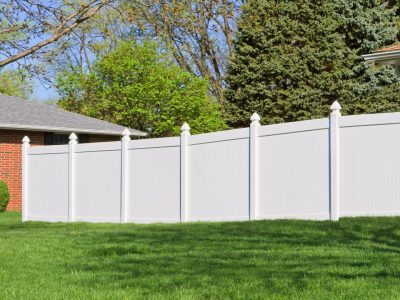
Material Composition
Vinyl fences are made of polyvinyl chloride (PVC), a robust synthetic material known for its strength and resistance to the elements. This material doesn’t rot, warp, or corrode like wood or metal, making it a top choice for a long-lasting fence.
Durability Factors
What makes vinyl fences so durable? They owe their longevity to several factors:
- Weather Resistance: Vinyl can endure extreme weather conditions, from scorching summers to freezing winters, without deteriorating.
- Insect Resistance: Unlike wood, vinyl doesn’t attract termites or other wood-boring pests, ensuring that your fence remains intact.
- UV Protection: Vinyl fences come with UV inhibitors, which protect them from the harmful effects of the sun, preventing fading and cracking.
Maintenance Needs
Vinyl fences are virtually maintenance-free. Unlike wood, they don’t require regular staining or painting. Cleaning is a breeze—just a simple wash with soap and water will keep your vinyl fence looking brand new.
Cost Comparison
While the upfront cost of vinyl fencing can be higher than some other materials, it’s a wise long-term investment. You’ll save on maintenance, repairs, and replacements over the years. The initial expense is outweighed by the durability and minimal upkeep.
If you’re looking for a fence that lasts the longest with minimal effort, vinyl is your top choice. Its impressive durability, resistance to the elements, and low maintenance requirements make it a smart investment for your property.
Wooden Fences
Wooden fences have been a popular choice for centuries, adding a touch of rustic charm to properties. However, they come with their own set of considerations when it comes to longevity.
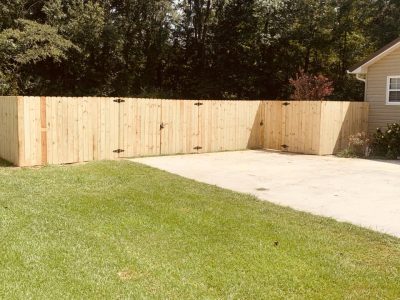
Types of Wood
The type of wood used plays a crucial role in how long a wooden fence lasts. Common options include cedar, pine, and redwood. Cedar is naturally resistant to decay and insects, making it one of the more durable choices. Pine, while more affordable, may require more maintenance, and redwood falls somewhere in between.
Lifespan
On average, a well-maintained wooden fence can last between 15 to 20 years. However, this lifespan can vary significantly based on factors like climate, maintenance, and the type of wood used. In areas with harsh weather conditions, the lifespan might be shorter.
Maintenance Requirements
The Achilles’ heel of wooden fences is their maintenance demands:
- Staining or Painting: Wooden fences require periodic staining or painting to protect them from the elements. This maintenance task can be time-consuming and costly.
- Rot Prevention: Regular inspections are necessary to spot signs of rot, which should be promptly addressed to prevent it from spreading.
- Termite Vigilance: Wooden fences are vulnerable to termite infestations, so vigilance is required to protect against these wood-boring pests.
- Warped Boards: Over time, boards can warp due to moisture and sun exposure. Replacing warped boards is essential to maintain the fence’s integrity.
However, if you’re looking for a fence material that requires less maintenance and offers greater longevity, other options like vinyl or metal might be worth considering.
Maintenance & Cost Overview
| Fence Type | Maintenance Required | Cleaning Frequency | Upfront Cost | Long-Term Investment |
|---|---|---|---|---|
| Vinyl | Minimal (wash occasionally) | 1–2 times/year | $$$ | High – lasts decades, minimal upkeep |
| Wood | High (staining, rot & termite checks) | 1–2 times/year or more | $$–$$$ | Moderate – frequent maintenance needed |
| Chain-Link | Low (repair & occasional cleaning) | 1 time/year | $–$$ | Moderate – limited lifespan |
| Metal | Medium (rust treatment if needed) | 1–2 times/year | $$$–$$$$ | High – long lifespan, low repairs if coated |
Chain-Link Fences
Chain-link fences are a budget-friendly option, but they come with certain limitations in terms of longevity.
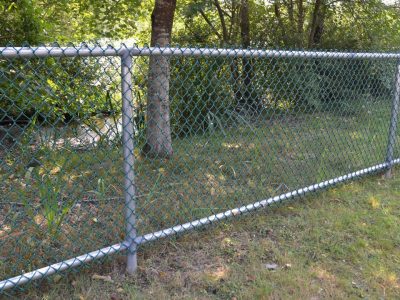
Lifespan
The lifespan of a chain-link fence is typically around 15 years. While this can vary depending on factors like climate and maintenance, chain-link fences are generally not as durable as other materials like vinyl or metal.
Pros and Cons
Here’s a quick look at the pros and cons of chain-link fences:
- Affordability: Chain-link fences are one of the most cost-effective options for fencing.
- Visibility: They don’t obstruct views and provide security without compromising visibility.
- Low Maintenance: Chain-link fences require minimal maintenance. Occasional cleaning and repairs are usually sufficient.
However:
- Aesthetics: They may not be the most attractive fencing option and may not enhance the curb appeal of your property.
- Durability: While they can withstand moderate wear and tear, they are not as resilient as vinyl or metal fences.
- Privacy: Chain-link fences offer little to no privacy, which might not be suitable for all properties.
Suitable Uses
Chain-link fences are often used for:
- Security: They provide a barrier that can deter trespassers and intruders.
- Pet Enclosures: They are suitable for creating safe spaces for pets in your yard.
- Sporting Facilities: Chain-link fences are commonly found in sports facilities and recreational areas.
Are Maintenance-Free Fences the Most Durable and Long-Lasting Option?
When it comes to choosing low-maintenance fence solutions, many people wonder if maintenance-free fences are truly the most durable and long-lasting option. These fences are designed to require minimal upkeep, making them attractive for busy homeowners. It’s important to consider factors such as material quality and environmental conditions before making a decision. A well-built and properly installed maintenance-free fence can indeed offer excellent durability and longevity, but it’s crucial to do thorough research to ensure it meets your specific needs.
Is the Split Rail Fence a Long-Lasting Option?
When considering split rail fencing, it is important to be aware of the challenges of split rail fencing. While this type of fence can provide a rustic and natural look, it may not be the most durable option in terms of longevity. Factors such as weather conditions and ongoing maintenance demands can impact its lifespan. However, with proper care and occasional repairs, a split rail fence can still be a viable choice for those seeking a charming and budget-friendly fencing solution.
Final Verdict
When it comes to longevity, the choice of your fence material matters.
Vinyl fences emerge as the champions of durability, offering impressive resistance to the elements, insects, and the sun’s harmful effects. With minimal maintenance, they stand the test of time.
Wooden fences, while classic, demand regular staining, rot prevention, termite vigilance, and board replacements. Their lifespan varies based on climate and maintenance.
Chain-link fences, budget-friendly and low-maintenance, have a moderate lifespan and are suitable for specific purposes like security and pet enclosures.
Choose wisely, as the right fence can save you time and money in the long run.
FAQ
What type of fence lasts the longest with the least maintenance?
Vinyl and metal fences last decades with minimal upkeep. They resist rot, insects, and weather damage, making them ideal for homeowners seeking durability and low-maintenance fencing.
How long does a metal fence last compared to vinyl?
Metal fences, like aluminum or steel, can last 20–30+ years with proper care. Vinyl fences also last 20–30 years, but require less maintenance and never rust or corrode.
What is the most durable fence material for harsh weather?
Vinyl, aluminum, and steel fences withstand harsh climates best. They resist moisture, strong winds, and extreme temperatures far better than untreated wood, maintaining strength and appearance longer.
Does wood fencing last as long as vinyl or metal?
Wood fences generally last 10–20 years, depending on type and maintenance. Vinyl or metal fences usually outlast wood, offering longer durability with less upkeep and weather-related damage.
What fence type gives the best long-term value for the cost?
Vinyl fences offer excellent long-term value due to durability, low maintenance, and aesthetic appeal. Steel or aluminum may cost more initially but also provide lasting strength and minimal upkeep.


